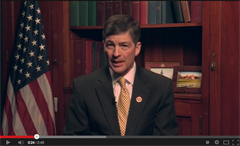House Republican Conference Features Chairman Hensarling
Washington,
March 27, 2014
|
Staff
Tags:
Full Committee
From House Republican Conference:
On Tuesday, the House Financial Services Committee convened a hearing examining our nation's debt and why it matters. Witnesses included David M. Cote, Chairman and CEO of Honeywell; Alice Rivlin, former Director of the Congressional Budget Office; and Douglas Holtz-Eakin, President of the American Action Forum. In this week’s Committee Spotlight, Chairman Jeb Hensarling (R-TX) provides a recap of the hearing, plus key clips of witness testimony. CLICK HERE TO WATCH Please also see below the Read Out from the Hearing: House Financial Services Committee Examines the Impact of our Nation's Debt On Tuesday, March 25, the House Financial Services Committee held a hearing on why the national debt matters. This was the first in what will be a series of hearings focused on the threat posed by our nation’s spending-driven debt crisis that the committee will hold this year. Our nation is on an unsustainable fiscal path that leads to national bankruptcy – driven by spending money we don’t have. Over the next 10 years, according to CBO’s baseline estimates, spending will grow as a share of GDP by 10% while revenues will grow by only 5%. Republicans and Democrats in Congress can disagree on what the federal government spends money on or the appropriate level of revenue, but everyone should be able to agree that when spending grows at twice the rate of revenue – that’s a serious problem. The national debt is merely a symptom, the disease is out-of-control spending. To quote President Obama, the "major driver of our [debt]...is Medicare and Medicaid and our health care spending. Nothing else comes close." The only way we will solve our nation's debt crisis is to stop spending money we don't have and to get serious about reforming our nation's entitlement programs. The threats posed by our spending-driven debt crisis are not academic; they have real world implications for the daily lives of the American people. Failure to deal with our nation's out of control spending and unsustainable debt poses a threat to jobs, our economy, and our national security. According to CBO’s Long-Term Budget Outlook, a large and growing debt would have “significant negative consequences for both the economy and the federal budget.” Admiral Mike Mullen, former Chairman of the Joint Chiefs of Staff, said, “I think the biggest threat we have to our national security is our debt.” According to the Heritage Foundation, in 2030, entitlements plus interest will consume ALL tax revenues – requiring spending on every other federal priority, from the National Defense to Food Stamps and to housing vouchers, to be borrowed. Witnesses at Tuesday’s hearing included public and private sector experts who discussed the harm our rising national debt has on our economy. Some of the key statements from these witnesses include: David M. Cote, Chairman and CEO of Honeywell: “For those who think this is just a Wall Street problem, look at it this way: When 10 year Treasury notes go to seven percent, and as a result home mortgages go to 10 percent and car loans to 13 percent, families will have fewer dollars. That’s now a Main Street problem.” Alice Rivlin, a former Congressional Budget Office Director who also served as director of the Office of Management and Budget and is now with the Brookings Institution: ““High levels of debt increase our vulnerability to shifts in investor confidence and the whims of foreign governments. With substantial fractions of U.S. Treasuries held by foreign governments and central banks, this is a serious concern and can limit our foreign policy flexibility.” Douglas Holtz-Eakin, President of the American Action Forum and a former director of the Congressional Budget Office: “The federal budget outlook is quite dire, harms economic growth, and ultimately raises the real threat of a sovereign debt crisis. The severity of the consequences of an eventual crisis, rather than the capacity to predict its exact timing, should induce the urgency to address it, and hearings such as this advance that goal.” The national debt is the single greatest existential threat facing our nation and it is a disservice to the American people not to put this threat front and center of every debate in Washington. |


